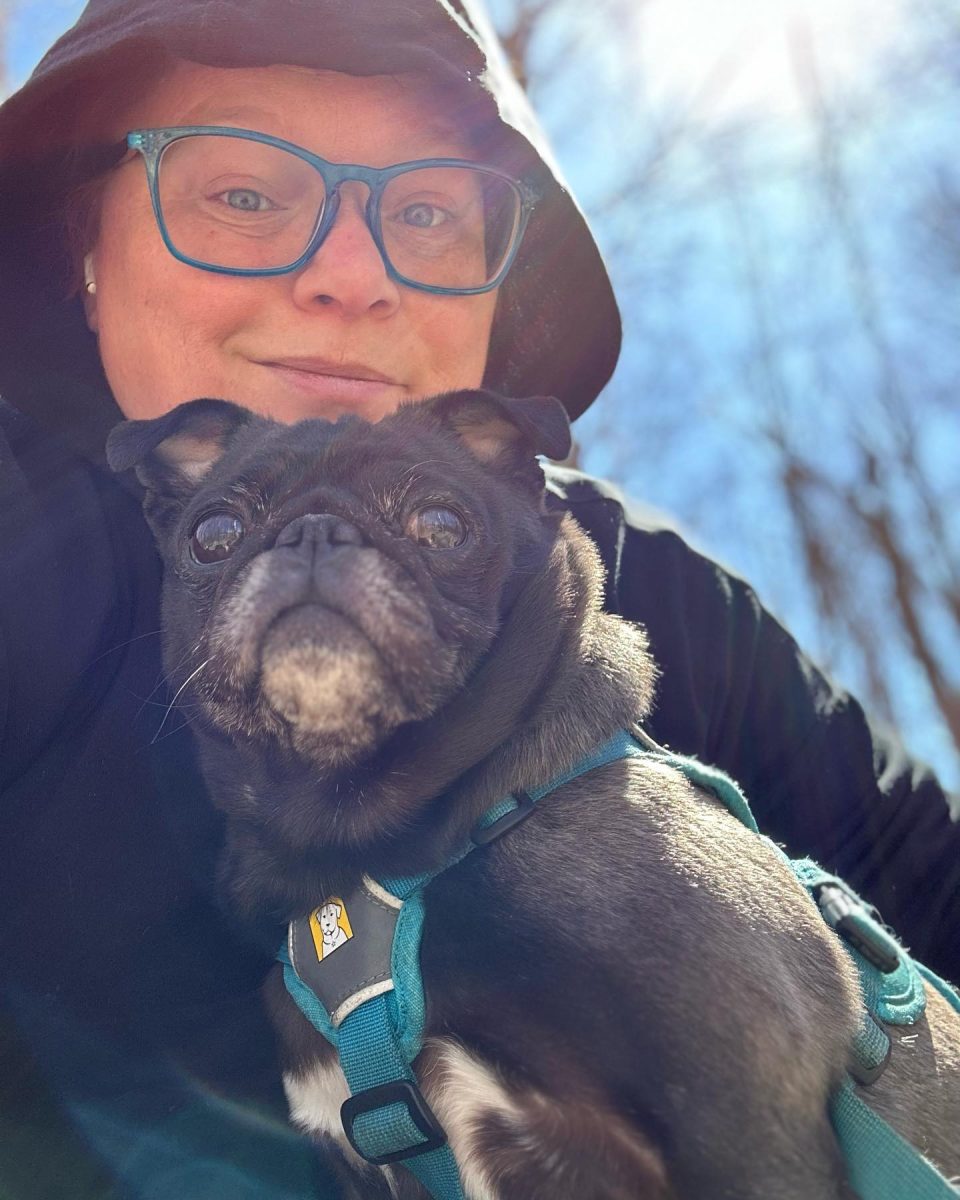At the northern outlet of an ancient smuggling route sits the aptly named Smugglers’ Notch Distillery. The building is inconspicuous, with dark wood siding and plenty of nooks and angles, and it fits seamlessly into the village where it is located, Jeffersonville, Vermont. The style of the facility is at once both old and new. One can almost imagine a small fleet of Model-A Ford trucks rolling in under the cover of darkness, up to the back loading dock, and a small crew of darkly dressed men racing to unload cases of Canadian whiskey. Almost. Perhaps it’s just the location, which is at the intersection of Route 15 and Vermont 108, seven miles south of Smugglers’ Notch.
From the front door beneath their sign, the Green Mountains tower in the distance, creating the watershed that yields their signature vodka.
The company has been operating for a little over a year, but judging from their accolades and rave reviews this seems improbable. They have succeeded in bringing to market a vodka which is considered by many of the world’s experts to be of the highest caliber.
The company is owned and operated by a father and son team, Ron and Jeremy Elliott. Until recently, their primary product has been their much-lauded vodka. One of the awards it has garnered so far was being named the number one domestic vodka in the country last June by Wine Enthusiast magazine, which is considered a gold standard in the art of rating and measuring quality in the world of spirits and wines. The Beverage Tasting Institute gave the vodka a 92 rating (out of 100) describing it as “Clear…soft and silky textured with a dry light-to-medium body…very smooth and malleable.” At the World Spirit Competition in San Francisco in March 2011, it received Double Gold, a remarkable accolade according to co-owner Ron Elliott, who said a spirit must be awarded a gold rating (the highest) from all 33 judges. In other words, 33 of the most discerning noses and palates in the industry must all agree that the spirit is of the highest caliber. Elliot describes these three different awards as “winning the triple crown.”
The first impression one gets upon entering the building is how immaculate the facility is. It is spotless, warm and inviting. The location serves many functions for the distillery. The front of the house is divided into a business office on the northern end and a store front on the southern end.
The back of the building houses the distillery and bottling facility for their research and development.
“It’s the process. Our vodka is the purest of the pure,” Elliot says. “Most vodkas are filtered with charcoal which removes the taste profiles and the impurities; so there’s no taste to it at all. It’s just ethanol…Those vodkas that give you a headache the next day…those are the impurities.”
By contrast, the Elliots’ process is to make this type of flavor-robbing filtration unnecessary by first starting with the finest ingredients. Chief among these, he says, is their water.
They use pure Vermont spring water that is run through a series of filtration processes including running it through charcoal as well as double osmosis filter.
They prefilter the water to ensure its purity before they start the distilling process.
Elliot then points to the high quality of the other main ingredients, winter wheat and corn.
But the main reason their vodka is so pure, he says, is the distillation process they use.
He describes a process involving an upright still, as opposed to the far more common horizontal still (think a moonshiner’s still with a curly copper tube).
The difference here gets a little technical, but the bottom line for the non-expert struggling to understand is that with their distillation process, the vodka is distilled many more times than a bottom-shelf brand is (or even many respected name brands).
“Every time you distill it, you take out more impurities,” says Elliot. “With our process, our vodka is distilled, theoretically, 91 times because of our vertical still. We don’t need to filter it and rob it of all the taste profiles.”
Elliot’s son, Jeremy, is the brains behind the vodka, and Ron is the brains behind the business, although you get the sense that they could both do the other’s job. Jeremy is a UVM graduate who started his professional life as a chemist in the pharmaceutical industry.
When the company Jeremy was working for decided to move
overseas from New York state, Jeremy decided to pursue a budding passion, making vodka.
After apprenticing with several distillers, he and his father began to cultivate their dream of making their own vodka.“His goal,” Elliot said, beaming like a proud father, “was to make the finest vodka in the world. And I think he has.”
Elliot himself had a successful career in the business world, which he says made him well suited to running the business end of their company.
He seems to be doing very well at it; one of 10 distillers in the state, Smugglers’ Notch Distillery was the first to take advantage of a recent law allowing distillers in Vermont to sell their products from a
storefront.
In addition to selling their products at the distillery, the Elliots offer periodic tastings as well for those of verifiable legal age.
Elliot says the distillery is hoping to launch a gin this summer.
As for the more-distant future, he is noncommittal: “We’re just playing around right now.,” he says. “Could be a whiskey…could be a grappa. We’re not really sure.”
Whatever happens, it is most likely to happen here inside the distillery.
Along the back of the building is their on-site inventory, their bottling area, and their aforementioned vertical still. There are rows of barrels along the back wall, which are for their newest product, their rum, which is aged in charred white oak barrels.
“Today is the first day we can sell it,” he says. “We can only sell it right here from the store.”
Elliot has just won approval to start selling their rum, and distribution through state outlets is soon to follow.
He proudly shows off a bottle of their newest product, which has its state tax seal across its cork.
The seal is numbered by bottle and barrel. He is holding bottle #1 from barrel #1.
Elliot smiles broadly. “You have to have a passion for what you do,” he says, “and Jeremy and I have a passion for what we do.”






